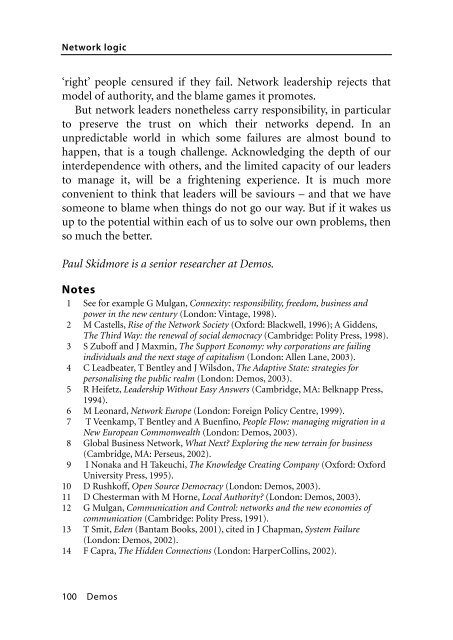Network Logic - Index of
Network Logic - Index of
Network Logic - Index of
Create successful ePaper yourself
Turn your PDF publications into a flip-book with our unique Google optimized e-Paper software.
<strong>Network</strong> logic<br />
‘right’ people censured if they fail. <strong>Network</strong> leadership rejects that<br />
model <strong>of</strong> authority, and the blame games it promotes.<br />
But network leaders nonetheless carry responsibility, in particular<br />
to preserve the trust on which their networks depend. In an<br />
unpredictable world in which some failures are almost bound to<br />
happen, that is a tough challenge. Acknowledging the depth <strong>of</strong> our<br />
interdependence with others, and the limited capacity <strong>of</strong> our leaders<br />
to manage it, will be a frightening experience. It is much more<br />
convenient to think that leaders will be saviours – and that we have<br />
someone to blame when things do not go our way. But if it wakes us<br />
up to the potential within each <strong>of</strong> us to solve our own problems, then<br />
so much the better.<br />
Paul Skidmore is a senior researcher at Demos.<br />
Notes<br />
1 See for example G Mulgan, Connexity: responsibility, freedom, business and<br />
power in the new century (London: Vintage, 1998).<br />
2 M Castells, Rise <strong>of</strong> the <strong>Network</strong> Society (Oxford: Blackwell, 1996); A Giddens,<br />
The Third Way: the renewal <strong>of</strong> social democracy (Cambridge: Polity Press, 1998).<br />
3 S Zub<strong>of</strong>f and J Maxmin, The Support Economy: why corporations are failing<br />
individuals and the next stage <strong>of</strong> capitalism (London: Allen Lane, 2003).<br />
4 C Leadbeater, T Bentley and J Wilsdon, The Adaptive State: strategies for<br />
personalising the public realm (London: Demos, 2003).<br />
5 R Heifetz, Leadership Without Easy Answers (Cambridge, MA: Belknapp Press,<br />
1994).<br />
6 M Leonard, <strong>Network</strong> Europe (London: Foreign Policy Centre, 1999).<br />
7 T Veenkamp, T Bentley and A Buenfino, People Flow: managing migration in a<br />
New European Commonwealth (London: Demos, 2003).<br />
8 Global Business <strong>Network</strong>, What Next? Exploring the new terrain for business<br />
(Cambridge, MA: Perseus, 2002).<br />
9 I Nonaka and H Takeuchi, The Knowledge Creating Company (Oxford: Oxford<br />
University Press, 1995).<br />
10 D Rushk<strong>of</strong>f, Open Source Democracy (London: Demos, 2003).<br />
11 D Chesterman with M Horne, Local Authority? (London: Demos, 2003).<br />
12 G Mulgan, Communication and Control: networks and the new economies <strong>of</strong><br />
communication (Cambridge: Polity Press, 1991).<br />
13 T Smit, Eden (Bantam Books, 2001), cited in J Chapman, System Failure<br />
(London: Demos, 2002).<br />
14 F Capra, The Hidden Connections (London: HarperCollins, 2002).<br />
100 Demos
















